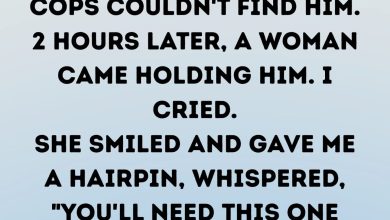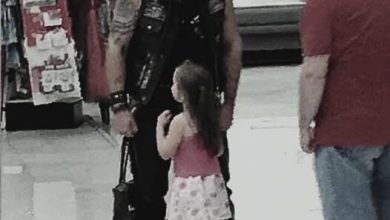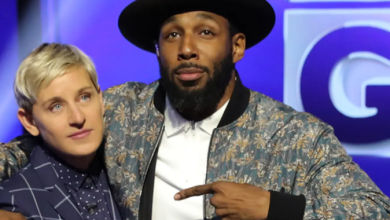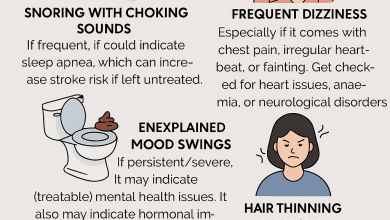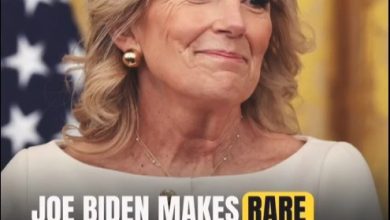Thug Slapped an 81-Year-Old Veteran in Front of 47 Bikers
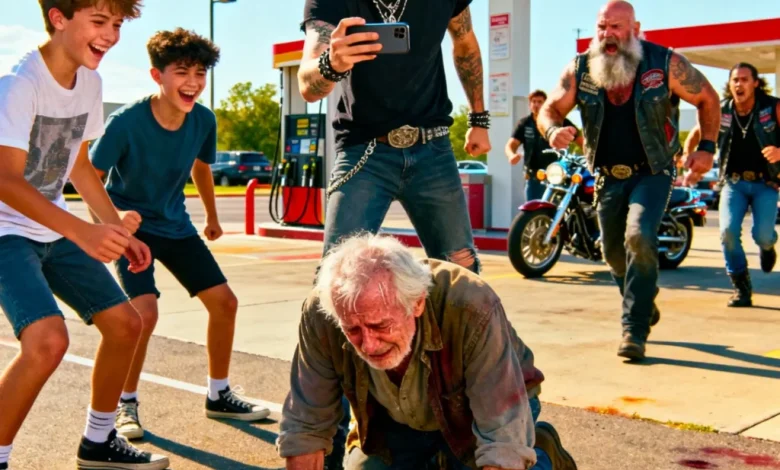
The punk slapped the old veteran so hard that his hearing aid skittered across the parking lot, unaware that 47 bikers were watching from inside.
I was filling up at the Stop-N-Go on Highway 49 when I heard it. The clean crack of palm on cheek, followed by plastic bouncing on concrete.
I turned and saw Harold Wiseman, 81 years old, Korean War vet, Purple Heart recipient, on his knees. Blood trickled from his nose.
The kid looming over him was maybe 25. Backwards cap, face tattoos, pants sagging, phone up to record while two buddies laughed.
“Should’ve minded your business, old man,” the punk said, zooming in. “This is gonna blow up. ‘Old head gets dropped for talking trash.’ Say cheese, grandpa.”
What he didn’t know: Harold hadn’t talked trash. He had asked them to move out of the handicapped spot so he could park closer with his oxygen tank.
What he also didn’t know: the Stop-N-Go is our usual fuel stop, and 47 members of the Savage Riders MC were in the back having our monthly meeting.
I’m Dennis “Tank” Morrison, 64, president of the Savage Riders. We were wrapping our safety briefing when the noise cut through.
Through the window, I watched Harold try to rise, hands shaking as he patted for his hearing aid.
“Brothers,” I said quietly. “We’ve got a situation.”
Harold comes there every Thursday at 2:00 PM for a lottery ticket and a coffee. He has done that for fifteen years, ever since Mary passed. Singh, the owner, always has it ready. Two sugars, no cream. Harold sits, tells a Korea story, scratches his ticket, heads home.
Everyone knows Harold. Forty years at the Ford dealership. Free fixes for single moms. Half the kids in town learned to change oil in his garage. Never asked a thing in return.
Now he was bleeding on the asphalt while three punks filmed for clicks.
The punk toe-punted the hearing aid across the lot. “What’s wrong, grandpa? Can’t hear me now? I said get up.”
At 81, skin tears. Blood mixed with old oil stains as he tried to push himself up.
“Please,” Harold said, voice unsure without the hearing aid. “I just needed the spot—”
“Nobody cares what you need,” the friend barked, both phones recording. “Old man thinking he runs the place. It’s our turn now.”
I gave the signal.
Forty-seven bikers stood in unison. Chairs scraped. Singh stepped back from the counter.
We didn’t run. We moved out in pairs, boots landing in rhythm. Heads turned. The punk kept filming, oblivious.
“C’mon, say something for the camera. Apologize for disrespecting—”
He stopped when my shadow covered him. He turned, phone still rolling, and found my chest. Then he looked up.
“Problem here?” I asked, calm.
He tried tough. “Yeah, this old racist tried to tell us where to park. We handled it.”
“Racist?” I glanced at Harold on the ground. “Harold Wiseman? The man who paid for Jerome Washington’s funeral when his family couldn’t? The guy who taught half the Black kids here to fix cars for free? That Harold?”
His bravado faltered. The buddies dropped their phones, noticing the wall of leather and denim around them.
“He… he called us thugs.”
“No,” Harold said, still down. “I asked you to move from the handicapped spot. I have a permit. My oxygen—”
“Shut up.” The punk lifted his hand to slap again.
I caught his wrist mid-swing. Firm. “That’s enough.”
“Get off me. This is assault. I’m filming.”
“Good,” Crusher, my sergeant-at-arms, said. “Get every face. The cops will want witnesses when they charge you for assaulting an 81-year-old disabled vet.”
The punk yanked free. “We’re leaving.”
“No,” I said. “You’re not.”
“You can’t hold us.”
“I’m not. But you will pick up that hearing aid, apologize to Harold, and wait for the police.”
“I’m not apologizing to anything.”
Harold spoke up, voice steadier. “Let them go, Dennis. I’m okay.”
I looked at him. Bleeding. Humiliated. Hearing aid somewhere under a car. And still, he asked for mercy.
“You sure?”
“Violence doesn’t fix violence. Mary always said that.”
The punk snorted. “Yeah, listen to your grandpa. Violence doesn’t—”
The slap came quick. Not from me. From the punk’s girlfriend, who had just pulled up.
“DeShawn, what are you doing?” She marched over in scrubs. A nurse. “Is that Mr. Wiseman? Is that Mr. Wiseman on the ground?”
DeShawn went gray. “Baby, I can explain—”
“This man fixed my mama’s car for free. He got you a job at the dealership before you got fired for stealing.” Another slap. “And you put him on the ground?”
“He disrespected us—”
“How? By existing? By being old?” She knelt beside Harold. “Mr. Wiseman, I’m so sorry. Let me help.”
“Keisha?” Harold squinted. “Little Keisha Williams? You a nurse now?”
“Yes sir, thanks to your recommendation letter for my scholarship. Can you stand?”
Two of my brothers lifted Harold. Keisha checked his cuts. DeShawn tried to slip away. Crusher blocked him.
“Your girl’s right,” Crusher said. “Face it.”
“I don’t need to do anything. I’m out.”
His friends were already retreating, deleting clips.
“DeShawn,” Keisha said, still tending Harold. “Do you even know what this man has done for this town? Do you know why he comes here every Thursday?”
“I don’t care—”
“His wife is buried at Memorial Gardens. He visits her, then buys a ticket because she always said he’d win big. Fifteen years. Maybe fifty dollars total. He keeps playing because it keeps her close.”
The crowd stared at DeShawn. Most of them knew Harold. None of them liked what they were seeing.
“And you did this for views?” Keisha asked. “For likes?”
Singh came out with a first aid kit and Harold’s coffee. “On the house, Mr. Harold. From now on, always.”
We found the hearing aid. Crushed.
“That’s a three-thousand-dollar device,” I told DeShawn. “Hope the clout was worth it.”
“I don’t have that kind of money.”
“Find it.”
Keisha stood, Harold’s blood on her sleeves. “We’re done, DeShawn. I won’t be with someone who hurts elders for a video. Pack your things. Today.”
She helped Harold to a bench. My brother Doc, former Navy corpsman, did a proper check. Police arrived ten minutes later. Harold would not press charges.
“The boy lost enough today,” Harold said. “His girl, his pride, his good name. Maybe that’s enough.”
I wasn’t finished. “DeShawn, right?”
He nodded, empty of swagger.
“You will pay for the hearing aid. You will volunteer at the Veterans Center, where Harold already volunteers. And you will learn what respect means.”
“And if I don’t?”
I smiled a small, cold smile. “The store cameras got everything. Including your confession. Your choice. Redemption or prosecution.”
Six months later, we were back for the monthly meet. Harold had a new hearing aid. DeShawn had worked three jobs to cover it. Thursday, 2:00 PM, ticket and coffee.
He wasn’t alone. DeShawn sat beside him, listening to a story about the Chosin Reservoir. Not recording. Just listening.
“Then the Chinese surrounded us,” Harold said. “Below zero. No ammo. No food.”
“What happened?” DeShawn asked.
“We helped each other. Black, white, Hispanic. Didn’t matter. We lived because we had each other’s backs.”
DeShawn had been at the Veterans Center five months. Turned out the kid had talent. Good with tech. He got the old-timers video-calling grandkids, started a class on smartphone basics.
“Mr. Wiseman,” DeShawn said softly. “I’m sorry. Again.”
“You’ve said it enough, son.”
“Not enough.”
Harold patted his shoulder. “Your work says the rest. Keisha tells me you’re applying to community college.”
“IT program. Figured I should use my skills for something that helps people.”
“She also says you two are talking again.”
“A little. She wants proof I changed.”
“Smart woman.”
“Yeah. I was an idiot.”
“We all are sometimes. What matters is getting back up, and how we treat those who can’t.”
I walked over. “Harold. DeShawn.”
He tensed. Still wary of bikers. Can’t blame him.
“Relax,” I said. “Harold, we’re doing a ride Saturday. Poker run for the Veterans Center. You in?”
Harold chuckled. “I’m 81 with a bad hip. What am I doing on a bike?”
“Ride in the support truck. Keep the driver company.”
“I’ll think on it.”
I looked at DeShawn. “You can come too.”
“I don’t know bikes.”
“Neither did Harold at your age. Then he kept them running in Korea. Maybe he’ll teach you.”
After I left, I heard DeShawn ask, “Would you teach me?”
“Maybe,” Harold said. “First, scratch this ticket. My hands shake.”
DeShawn scratched. “You won a thousand dollars.”
Harold looked up. “Well, Mary. Took fifteen years, but you were right.” He glanced at DeShawn. “And I don’t just mean the money.”
That Saturday, Harold rode in the support truck while DeShawn drove. We raised five grand for the Veterans Center. DeShawn started showing up to events, setting up online donations, streaming the rides, turning the same social skills toward something good.
The slap video never went viral. The clip of DeShawn helping Harold onto the stage for a volunteer award did. A million views. Caption: “Six months ago I assaulted this hero. Today he calls me son. This is what forgiveness looks like.”
Keisha took him back. They are engaged. Harold will walk her down the aisle. Her father is gone, and she asked Harold to stand in.
Last Thursday I saw them at 2:00 PM, same table. Harold teaching DeShawn cribbage on a board older than both of them.
“My father’s,” Harold said. “He carried it in World War I. I carried it in Korea. One day I’ll pass it to someone who’s earned it.”
“That’s cool, Mr. Wiseman.”
“Harold,” he said. “We’re friends now.”
Friends. An 81-year-old white veteran and a 25-year-old Black kid who once hit him for views. Friends.
Singh brought two coffees. Two sugars, no cream.
“On the house,” he said.
“You can’t keep giving me free coffee,” Harold protested.
“I can. And I will. You too, DeShawn. Heroes drink free.”
“I’m no hero,” DeShawn said.
“Not yet,” Harold replied. “But you’re learning. Being a hero is choosing better than yesterday.”
As I pulled away, DeShawn carried Harold’s oxygen tank to the car. The same hands that knocked him down now held him up.
Redemption is not a moment. It is a string of small choices. Carrying an oxygen tank. Learning cribbage. Listening. Facing what you did and doing better.
DeShawn keeps a screenshot from that day. Not the video. Just one frame of Harold on the ground. He keeps it to remember who he was, so he never goes back.
Last week the Savage Riders did something new. We voted to sponsor DeShawn as a prospect. Not a full patch. Not yet. A chance.
The vote was unanimous.
When I told Harold, he smiled. “Good. The boy needs real brotherhood. Not the pretend kind.”
“Think he’ll make it?” I asked.
Harold scratched another ticket. Still playing. Still remembering Mary.
“He stood in front of a room full of veterans and admitted what he did. He kept showing up anyway. Yeah, he’ll make it. We all fall, Dennis. Not everyone gets back up. He did.”
The kid who slapped an old veteran for clicks became the man who teaches veterans to use their phones. The one who crushed a hearing aid took three jobs to replace it. The guy who filmed an assault now streams charity rides.
Because 47 bikers walked out and said, “That’s enough.”
Because an 81-year-old veteran said, “Let them go. Violence doesn’t fix violence.”
Because a young woman in scrubs demanded better from the man she loved.
Because redemption is possible.
Harold still comes every Thursday at 2:00 PM. He is rarely alone. DeShawn meets him there, often with other young men who have heard the story. They sit. They listen. They learn.
The punk who slapped him is gone. In his place stands someone Harold is proud to call son.
Somewhere, Mary is smiling. Her husband’s kindness changed another life.
That is the real lottery win. Not the thousand dollars. The transformation.
The hearing aid that flew across the lot is bronzed in our clubhouse. Above it hangs a small plaque:
“The sound of redemption is quieter than violence. It lasts longer.”
DeShawn mounted the plaque. Harold helped with the words.
